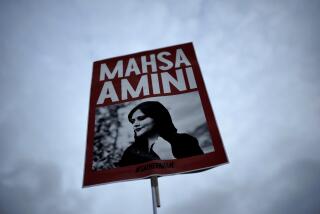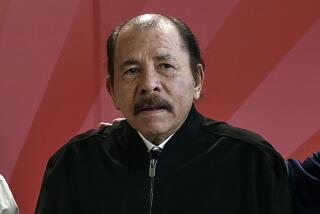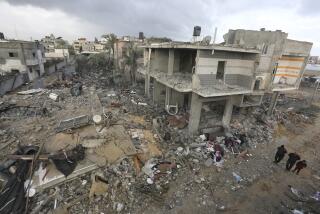In Egypt, anger grows over Mubarak’s health reports
It has been more than three months since former President Hosni Mubarak was ousted and more than a month since he was detained, yet he has not set foot inside Tora prison, where his two sons have been held during a corruption probe.
Egypt’s 83-year-old former ruler has insisted, with the help of state medical evaluations, that he suffers from a heart problem too complicated for prison doctors to treat.
The protesters who helped bring down Mubarak in February are growing increasingly angry over his diagnosis, which originated with examinations and reports by the country’s Department of Forensic Medicine, a division of the Justice Ministry widely criticized for covering up torture by security forces during his nearly 30-year rule.
Human rights activists say the legitimacy of Egypt’s new government rests largely on its ability to reform such institutions, transforming them from tools of a hated regime into instruments of justice.
“The controversy now surrounding Mubarak and his health centers on that institution,” said Khaled Fahmy, a professor at the American University in Cairo specializing in Egyptian medical and political history.
Fahmy said Mubarak maintained his grip on power by corrupting the forensic medicine department, among other government institutions, to suit his needs.
“It played an important role in maintaining and upholding the law. For the system to work, that [institution] had to be undermined,” he said.
Mubarak was detained April 13, but has been allowed to remain at a hospital near his villa in the Red Sea resort town of Sharm el Sheik after a report by Chief Coroner Sebaay Ahmed Sebaay said that Mubarak was too sick to be transferred to prison. His conclusion was backed up by doctors at the hospital, who have continued to evaluate Mubarak.
Sebaay’s report drew public criticism from other doctors who said that as a coroner, he was unqualified to evaluate the deposed leader’s heart condition. Earlier this month, a member of Sebaay’s staff claimed on Egypt’s ONTV satellite network that his office was corrupt and had falsified death reports for protesters shot by security forces during the revolution, certifying that they had died of tear-gas inhalation.
The whistle-blower, Farid Hashish, was briefly arrested after he spoke out but kept his job. On May 4, the prime minister announced Sebaay’s dismissal.
Sebaay’s former office declined to comment Saturday, but at least one other doctor there said he also faced retaliation after he complained about altering or falsifying death reports.
Mubarak’s medical claims are expected to face added scrutiny after thousands of protesters took to Tahrir Square on Friday demanding that the former president be imprisoned.
In an apparent effort to satisfy the protesters, Egypt’s public prosecutor announced Friday that he had appointed a medical committee to evaluate whether Mubarak can be transferred to Tora, promising that the interior minister would inspect the prison hospital himself.
As of Saturday, the former president apparently was still suffering from heart problems and depression, and the committee — which includes three heart specialists and two military doctors — had not made any recommendations concerning his transfer, according to statements by the hospital manager.
Hossam Bahgat, executive director of the Cairo-based Egyptian Initiative for Personal Rights, said the new committee was not enough.
“The conduct of the Department of Forensic Medicine and its independence has been a cause of concern for the human rights community for some time,” Bahgat said. “What we need is more systematic reform.”
Bahgat has been monitoring the retrial of two police officers accused in last year’s fatal beating of Khaled Said, 28, in Alexandria, a case that sparked massive protests after Sebaay’s office issued a report claiming that Said had choked on marijuana he had swallowed to avoid arrest. Last summer, investigators exhumed Said’s body and reanalyzed forensic evidence in the case. A verdict is expected soon.
Bahgat and other human rights activists are demanding that the department be independently funded and run, with public oversight by an independent commission. They want guarantees that whistleblowers within the department will be protected. And they want to see Mubarak honestly examined by medical authorities.
“The revolution was about dignity and torture,” Fahmy said. “It is about subjecting his body to the same kind of scrutiny as Khaled Said’s body is right now as we speak.”
molly.hennessy-fiske@latimes.com
Mayy el-Sheikh in The Times’ Cairo bureau contributed to this report.
More to Read
Start your day right
Sign up for Essential California for news, features and recommendations from the L.A. Times and beyond in your inbox six days a week.
You may occasionally receive promotional content from the Los Angeles Times.







